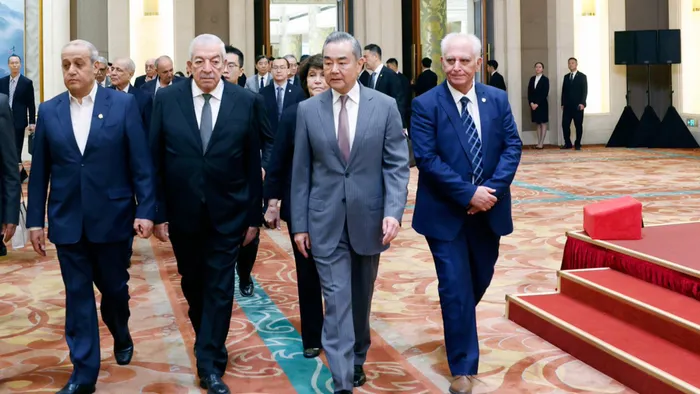Palestinian factions sign a deal in China to establish a unity government in post-war Gaza

The reconciliation agreement was reached after three days of intensive talks brokered by China, in which 14 Palestinian factions, including Hamas and Fatah, took part. By reaching a unity deal, Palestinian factions are saying that the “day after war” in Gaza is a purely Palestinian matter. – Picture: Hua Chunying / X
By Aseel Saleh
Palestinian factions signed a national unity agreement on July 23, in China’s capital Beijing, to end a 17-year power sharing conflict between the Palestinian National Liberation Movement (Fatah), and the Palestinian Islamic Resistance Movement (Hamas).
The reconciliation agreement was reached after three days of intensive talks brokered by China, in which 14 Palestinian factions, including Hamas and Fatah, took part.
By signing the agreement, Palestinian factions came to a consensus to reach comprehensive Palestinian national unity, which encompasses all Palestinian forces and factions under the umbrella of the Palestinian Liberation Organisation (PLO) as the only legitimate representative of the Palestinian people.
The agreement stipulated the commitment to establishing an independent Palestinian state, with Al-Quds as its capital, and forming an interim national unity government after the approval of Palestinian factions and the president of the Palestinian Authority.
The agreed-upon government would exercise authority over all Palestinian territories including the West Bank, Al-Quds, and the Gaza Strip. The clauses of the agreement outlined that all factions should work to end the siege imposed on the Palestinian people in the Gaza strip and the West Bank, and to guarantee unrestricted delivery of humanitarian aid to the Palestinian people.
Additionally, Palestinian factions agreed to “confront conspiracies of the Israeli occupation and its continuous violations against Al-Aqsa Mosque, and resist any harm to it and the city of Al-Quds and its sanctities”, according to information obtained by Al Mayadeen.
Furthermore, the agreement called for guaranteeing the Palestinian right of return in accordance with the United Nations General Assembly Resolution 194.
As per the resolution, “refugees wishing to return to their homes and live at peace with their neighbours should be permitted to do so at the earliest practicable date, and that compensation should be paid for the property of those choosing not to return and for loss of or damage to property which, under principles of international law or equity, should be made good by the Governments or authorities responsible”.
The agreement also asserted the Palestinian people’s right to resistance to end the occupation, and their right to self-determination and struggle by all available means in accordance with international law and the UN charter.
According to Al Mayadeen, the implementation of the agreement clauses will be monitored by all Palestinian factions with the help of Egypt, Algeria, China and Russia.
Hamas hailed the agreement, emphasising the importance of national unity for the Palestinian people.
“Today we sign an agreement for national unity and we say that the path to completing this journey is national unity,” senior Hamas official Mousa Abu Marzouk said during the closing ceremony of the talks in Beijing.
Reuters quoted Hussam Badran, a senior Hamas official describing the agreement as a “formidable barrier against all regional and international interventions that seek to impose realities against our people’s interests in managing Palestinian affairs post-war”.
The Israeli occupation condemned the agreement between the Palestinian factions later on Tuesday, as it would include Hamas as part of the interim national government ruling post-war Gaza. Israeli Foreign Minister Israel Katz accused Palestinian president Mahmoud Abbas of embracing Hamas, insisting that “Hamas rule will be crushed”.
This article was first published on Peoples Dispatch